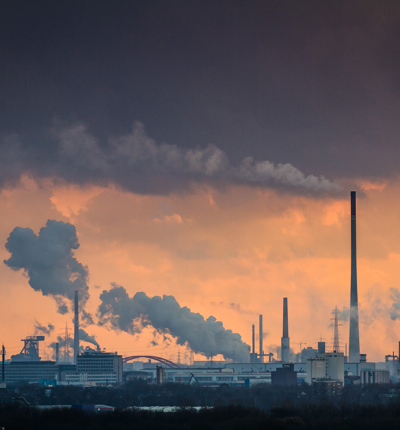
Legal move prompts government review of industrial strategy
The government has reviewed its industrial strategy after concerns were raised in a legal letter over the environmental impacts of carbon capture and storage.
Posted on 26 September 2025
Campaign group Scrap Carbon Capture (ScrapCC) challenged the Business Secretary’s (SoS) decision to approve the UK’s Modern Industrial Strategy (IS), arguing that the impacts of promoting and supporting gas-based carbon capture for electricity generation or ‘blue hydrogen’ production had not been properly presented to the SoS when making his decision.
The IS was approved and published by the government in June 2025, and highlights several ‘clean energy’ sectors for prioritising growth, including carbon capture and hydrogen.
The hydrogen sector includes the production of blue hydrogen - hydrogen produced from natural gas, often imported into the UK in liquified form, with some of the byproduct of carbon dioxide captured and stored underground via the carbon capture and storage process.
ScrapCC says these methods still involve the release of substantial amounts of greenhouse gases. This includes upstream emissions associated with the supply of natural gas, methane leakage and flaring at source, and carbon dioxide emissions not contained by the carbon capture process, or vented later.
The group says that investment in this kind of infrastructure would result in significant amounts of greenhouse gas emissions being released over the coming decades, amounting to material environmental impacts.
In its legal letter, ScrapCC argued that the environmental impacts from the inclusion of these sectors in the policy were not properly assessed, and that as a result the SoS had not had due regard to the Environment Principles and Policy Statement (EPPS).
ScrapCC cited section 19 of the Environment Act 2021, which placed a duty on the SoS to have regard to the EPPS. This requires policymakers to take into account the environmental impacts of decisions they make. The group argued that this process had not been followed, as the full environmental impacts of the IS had not been properly assessed and presented to the SoS.
Responding to the letter, the government confirmed it had reviewed the decision to approve the IS, in light of the issues raised by ScrapCC. Following the review, the government confirmed that no EPPS assessment was made of gas-based carbon capture and storage, and advised that an assessment would be deferred until the exact nature of the carbon capture and blue hydrogen developments are known.
While ScrapCC has welcomed the review, the group will keep a watching brief on whether the environmental assessments for the IS are adequate, and remains concerned that the consequence of the IS is that the UK will be “locked in” to future fossil fuel use.
Dr Andrew Boswell, scientist and lead campaigner at Scrap Carbon Capture, said:
“This is a big win - for the first time, the government has been forced to retake a policy decision because its Environmental Principles Policy Statement (EPPS) assessment was hugely deficient, a tacit acknowledgement that it was most likely unlawful. Earlier this year, the Office for Environmental Protection warned that ministers must make EPPS assessments more robust and transparent. Yet for the Industrial Strategy - covering a third of the UK economy to 2035 - the assessment was light-touch in the extreme.
“Ministers did not even address the impacts of Carbon Capture and Storage (CCS) - one of the most contested areas of climate policy, with huge uncertainty over its full environmental impacts. That omission was indefensible, and shows why ministers later knew they would likely lose the judicial review we had begun.
“But even after the review, the assessment remains inadequate. The government has simply deferred doing an EPPS assessment on CCS, as if promising to deal with it later is enough to meet their legal duty. We consider it is not - especially when ministers have already committed over £22 billion of taxpayers’ money to subsidise CCS. This case exposes how the government is eroding environmental protections to lock the UK into continued fossil fuel use. It is also a major win for campaigners pressing to ensure EPPS assessments are robust, transparent and enforceable across all government decision-making."
Leigh Day solicitor Rowan Smith, who represents ScrapCC, said:
“Whilst the government’s industrial strategy remains in place, our client is pleased that a review of the decision to approve it has taken place - in effect, acceptance that there had been gaps in the initial assessment of the strategy. Nonetheless, our client remains critical of the inclusion of carbon capture and storage industries in the strategy with no EPPS assessment at all. This keeps the UK tied into using fossil fuels for years to come, when their full environmental cost may not have been completely appreciated.”

Permission granted for legal challenge opposing demolition of Bastion House and Museum of London
Campaigners are set to have their legal challenge opposing the demolition of two historic buildings in the Barbican area of central London heard at the High Court.

Sussex Wildlife Trust launches claim against dumping of sediment in Beachy Head conservation zone
Wildlife charity Sussex Wildlife Trust has filed a legal claim contesting the decision to allow sediment waste from Brighton Marina to be dumped within the Beachy Head West marine protected area.


